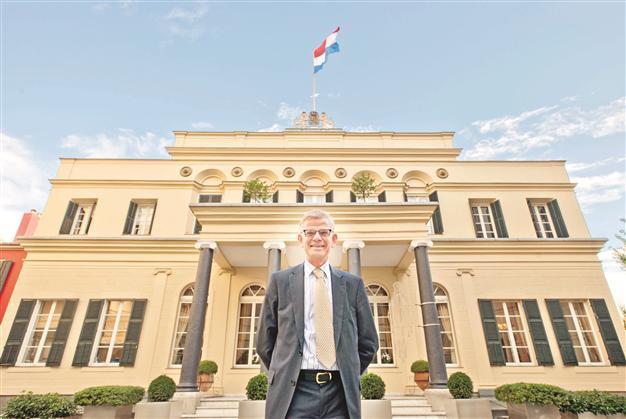Turkey - Netherlands ties, remarkable history: Envoy
ISTANBUL - Hürriyet Daily News

Consul General Onno Keervers
Consul General of the Netherlands in Istanbul Onno Kervers and Cultural Attaché Daniel Stork have shown their support of the events marking the 400th anniversary of the start of diplomatic relations between Turkey and the Netherlands.
“There are not many countries with which we have such long-lasting ties, and this should be given importance. The Netherlands was first recognized by the Ottoman Empire when it was established. Thus this history has great importance for us. We have already had deepening ties with Turkey over the last 10 years with the impact of economic development in Turkey, especially on investment. And there is a huge Turkish community living in the Netherlands. We decided to establish a platform to strengthen ties for this year, on economics, culture, academics and face-to-face relations,” said Kervers.
Commenting on the criteria considered in making the activity program, Kervers said: “The main criteria is to build a balanced unity between events like a Rembrandt exhibition, [collaboration with] Istanbul Modern, exhibitions at SALT-Van Abbe, Netherlands Dans Theater and Concertgebouw Orchestra, which will attract a huge audience, and a platform composed of young people and artists from the Dutch cultural stage. Part of the strategy is to include not only Istanbul but other parts of the country, because it is both easy and difficult to attract an audience. There are many activities in Istanbul and it is sometimes hard to find stages in the city. For instance, TÜYAP also reached İzmir, Adana and Diyarbakır. Another strategy is to unite Dutch institutions with ones in Turkey; for that reason we added museums, orchestras and theater groups to the activities, and we got this result.”
Asked what the most amazing activity was, Stork said the deployment of a ship from Amsterdam to Turkey. Kervers said he was surprised by how much attention the Rembrandt exhibition drew. “Another thing that is not surprising but affecting was how Netherlands Dans Theater and modern ballet attracted great enthusiasm when Istanbul was a European Capital of Culture in 2010.”
Kervers said the activities in the Netherlands also drew many visitors, while Stork said it was pleasing to see that Turkish projects in the Netherlands did not only focus on traditional arts. “There is a modern trade,” Stork said. “There is an improving art environment in Istanbul. It is important to us that Turkish people accept the Netherlands as a meeting point.”
Asked the specific reason why TÜYAP is showing special attention to the children’s and youth literature of the Netherlands, Kervers laughed. “I’m 58 years old. So I’m not the person who can comment on this issue. … But I can say that there has been great interest in literature since the second half of the year. We were active at a poetry festival and the Tanpınar Festival as well. The Writers Unlimited festival made its third visit in four years. International literature figures went to Istanbul, Ankara and Hatay to meet with their Turkish counterparts. The reason why children’s and youth literature made such a breakthrough is the appeal of this field. The history of this [type of] literature goes back to ancient times. It is always dynamic and has a changing core.” Stork said illustrations are an important part of children’s literature as well. “There will be a workshop at TÜYAP focused on the illustration of children’s books.”
Kervers said the state had made some limitations through a restructuring process due to the effect of the global economic crisis on state support of the arts in the Netherlands, while some institutions were merged and some abolished. “The same applies to the project we are working on. It is obvious that there won’t be any increase in support.”
Stork said in the past they had had good state support but after the crisis, sources allocated to the arts had diminished. “This causes uneasiness in the culture industry, but people have started to get used to it over the years. But there is still a difference when compared to Turkey. Most of this year’s exhibitions are done with the help of private sector capital. Greater efforts should be made for the culture industry. This is something we should also draw lessons from.”
